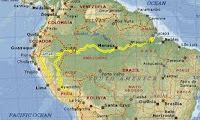The Tupi people inhabited almost all of Brazil's coast when the Portuguese first arrived there. In 1500, their population was estimated at 1 million people, nearly the same population of Portugal at that time. They were divided into dozens of tribes, each tribe numbering from 300 to 2,000 people. Despite the fact that they were a single ethnic group that spoke a common tongue, the Tupi were divided into several tribes which were constantly engaged in war with one another. Cannibalism was part of their ritual after a war. The warriors captured from other Tupi tribes were eaten as they believed they were absorbing their strength.
Tupi or not Tupi: that is the question
This phrase embodies the ideas of the Brazilian poet Oswald de Andrade in the Manifesto Antropófago (Cannibal Manifesto) published in 1928. The Manifesto played an important role in the modernism movement in Brazilian literature, for it argued that Brazil's history of "cannibalizing" other cultures was its greatest strength. Oswald de Andrade believed that literary cannibalism was a way for Brazil to assert itself against European post-colonial cultural domination.
The Manifesto's iconic line is "Tupi or not Tupi: that is the question." The line is simultaneously a celebration of the Tupi, who practiced certain forms of ritual cannibalism (as detailed in the 16th century writings of André Thévet, Hans Staden, and Jean de Léry), and a metaphorical instance of cannibalism: it eats Shakespeare.
-- this post was edited from http://bit.ly/g0l7hM and http://bit.ly/gNBJji



